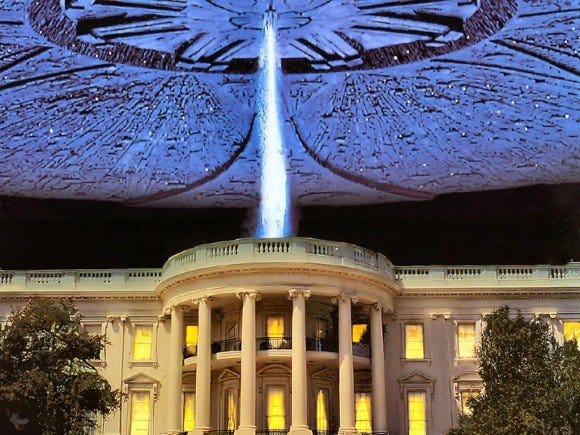
Since retired Major David Grusch last year accused the Department of Defense of hiding ships and bodies of non-terrestrial intelligence, a lot of water has passed under the bridge and many things have happened. In the meantime, the authenticity of the controversial Nazca mummies presented by the Mexican journalist Maussan has been established, and Colonel Carl Nell confirmed at SALT in New York what David Grusch declared last year, namely that it is not a secret in military circles that the Earth is an object of interest by non-human beings. Furthermore, Harvard University has recently declared that on Earth man has coexisted with crypto-terrestrial beings since time immemorial (which therefore in turn confirms the so-called Nazca mummies). So now the limit is full, and the next president of the USA will necessarily have to deal with these burning topics.
Talk of unidentified anomalous phenomena (UAPs) or UFOs has steadily evolved from fringe conspiracy theories to a legitimate national security concern. This change in perception has been mirrored by a growing public demand for transparency and disclosure of relevant government documents. As the 2024 presidential election approaches, the question of whether candidates will commit to releasing these documents has become a hot topic of discussion. The stakes are high, as the next president’s stance on UAP disclosure could significantly affect government transparency policies and public trust.
Candidates' position on UAPs in the 2024 elections
Recent social media campaigns have sought to place UAP disclosure at the forefront of the agendas of 2024 presidential candidates. These campaigns argue that candidates, regardless of their political affiliation, should openly engage in the declassification of UFO-related documents . This call to action highlights a broader desire for honesty and openness within the federal government, urging candidates to prioritize transparency in their policy proposals.
Public request for disclosure of UFO documents
There is a growing consensus among the American public on the need to lift the veil of secrecy surrounding the UAP documents. This call for declassification is not driven simply by curiosity but by a genuine concern for national security and government accountability. The public seeks factual information about UAPs to better understand potential threats and foster an environment of trust between the government and its citizens.
Historical stigma and its impact on whistleblowers
The stigma surrounding UFOs has long dissuaded whistleblowers from providing information. Prominent figures, such as Bob Lazar, were discredited and faced professional exile for their claims regarding government knowledge of extraterrestrial technology. This historical context highlights the need for cultural and procedural change within government agencies, fostering an atmosphere in which discussion of UAPs is not ridiculed but encouraged for the sake of transparency.
Bipartisan Congressional Efforts for Transparency
In an era marked by divisive politics, UAP disclosure represents a rare bipartisan issue. Initiatives such as the proposed UFO disclosure law demonstrate both parties' commitment to revealing the truth. These legislative efforts highlight the growing consensus that understanding and recognizing the existence of UAPs is crucial to national security and scientific progress.
Impact of teasing in political debates
The trivialization of UAP-related questions in political debates, as seen in previous exchanges, only serves to undermine public trust in elected officials. When candidates dismiss questions or respond with derision, they signal an unwillingness to seriously address voters' concerns. Such attitudes impede productive discourse and contribute to an environment of skepticism and disenchantment with the political process.
Implications of nondisclosure for national security
Maintaining the status quo of secrecy surrounding UAPs has tangible national security implications. Without public disclosure and informed discourse about the nature of UAPs, strategizing a comprehensive defense or understanding potential technological advances remains a challenge. A commitment to transparency and declassification of relevant documents could pave the way for greater preparedness and a safer nation.
Potential legislation and presidential
The push for disclosure of UAPs has made its way into the halls of Congress, prompting legislative proposals to force the release of classified documents. Such legislation, if passed, would not only mark a significant step toward government transparency but would also redefine presidential authority regarding national security secrets. The passage of these bills could serve as a catalyst for change, forcing future administrations to prioritize openness and truth in their governance.
Ultimately, the conversation surrounding UAP disclosure in the 2024 presidential election intersects with broader issues of government transparency, national security, and public trust. As candidates outline their positions on this issue, their answers will likely reflect their broader vision for America’s future. The time has come to reevaluate the layers of secrecy that have long obscured the truth about UAPs, calling for a new era of openness and accountability in American politics. In the meantime, the mediators of political debates on TV are starting to ask increasingly slippery questions to the candidates in the running who will necessarily have to read up on the subject, as trying to evade these questions is equivalent to telling the voters: if I am elected I will continue with the old politics of government cover-ups, and that could mean the difference between not getting elected and getting elected.
Oliviero Mannucci
Source: Medium
EBE & UAP Consultant for space and military organizations, film and TV technician, amateur astronomer from 1975, science communicator, blogger & more
No comments:
Post a Comment
Note: Only a member of this blog may post a comment.